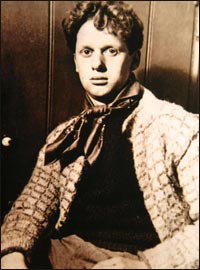Dylan Thomas, the spirit of South Wales
Gwen HERAT
Swansea's greatest son, Dylan Marlais Thomas was born there in 1914
and South Wales considers him as their Bard not second to William
Shakespeare, the Bard of England. He worked briefly as a junior reporter
on the South Wales Evening Post after leaving school and then embarked
on a literacy career in London. Swiftly, he established himself as one
of the finest poets of his generation. In 1934, Thomas published 18
poems, 25 in 1936 and Deaths and Entrances in 1946. In 1952 he wrote
Collected Poems. Throughout his young life Thomas wrote short stories.
His most famous was Portrait of the Artist As a Young Dog. He also wrote
several film scripts broadcast-scripts. He also lectured in America and
wrote the famous Under Milkwood for the radio. It was made into a film
later. Shortly after his thirty ninth birthday in 1953, Dylan Thomas
collapsed and died in New York. His body was buried in Laugharne, Wales,
his home for many years.
|

Dylan Thomas, the Bard of Wales |
The 1930s and 1940s saw the resentment to Thomas's poetry which
involved his association with Surrealism and New Romantic poetry. Where
Surrealism was concerned, it was important to stress that few poets
deserved the charge of 'automatic writing' than what Thomas wrote. The
twenty one year old Thomas felt humiliated when Richard Church voiced
about his surrealism as that of a immature violence and monotony in
rhythm, overweighed by imagery, making the reader not to understand his
poetry. In reality, Thomas had no time or patience for English
Surrealist poets of the 30s which made Richard Church's view incorrect.
His first collection of 18 poems hinted at the Surrealism he was accused
of. For instance, 'when like a running garve 'taken from this collection
in 1934; 'scythe of hair' and a 'turtle in a hearse' all point to
Surrealism.
The difficulty in these earlier poems obviously came from a crush,
not absence in meaning and the wit which connects them, was perhaps
known better to Thomas than many of us.
Thomas published 25 poems in 1936. The 1940s were Thomas's decade
because the 1930s dwarfed his presence because of the century's two
greatest poets, Yeats and Eliot. At the time, Yeats was drawing to the
end of his magnificent career though his posthumous Last Poems (1939)
stood strongly at the end of the decade. Eliot, who Collected Poems
appeared in 1936 was the on-going genius when the decade closed. Since a
generation tends to identify with its younger contemporaries, the
signature of Auden had been stamped out in the 1930s leaving the 1940s
for Thomas domination. Thomas and Auden together certainly look a
distance as from today. Thomas emphasised on the elements and emotive
while Auden on the intellectual and the detached. And without doubt, it
was the school and cultural background that caused English Auden's
intellectualism and Welsh Thomas's emotiveness each to undervalue the
other.
With the passing of years, Thomas came more and more into his own.
The publication of his fourth volume, Deaths and Entrances in 1946
included refreshing poems such as a refusal to mourn, poems in October,
the now famous Fern Hill, and most of the collected poems bound in
different editions.
His death in 1953 focused uncompromisingly the degree and nature of
his celebrity when the sense of climax and the large scale of shock
which was a natural moment now for the legendary life he left behind.
The fact that Thomas Hardy was at the same time Dylan Thomas's
favourite, reveals the rich and often contradictory heritage from which
the Movement poets sought their inspiration. A new reader approaching
for the first time to Thomas's work, will experience a refreshing
freedom with great distance.
Not me, by all means. The more I read Dylan Thomas, the more confused
I get. His poetic language is so different to the Welsh and English. May
be the Welsh understand him better and are convinced he is on equal
pedestal with William Shakespeare. And quiet naturally, he is their Bard
of Wales.
His house in Laugharne will be a citadel for his admirers, critics,
poets, students at the turn of the next century the way it is at
Stratford-upon-Avon for Shakespeare. It is already an enigma.
So, here is a poet, who like Shakespeare out-witted his intellectual
contemporaries who tried to take him to task on his academics. Like
Shakespeare, he emerged unscathed.
From the Fern Hill - 'And wake to the farm forever fled from the
childless land
Oh' as I was young and easy in the mercy of his means
Time held me green and dying
Though I sang in my chains like the sea.' |



